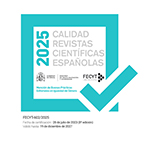Enfoque y alcance
Estudios sobre el Mensaje Periodístico (ISSN 1134-1629, ISSN-e 1988-2696) es una revista científica de periodicidad trimestral. Su objetivo fundamental es fomentar la investigación de las formas expresivas y de las funciones sociales del periodismo y la comunicación. Publica sus artículos en castellano, aunque admite también colaboraciones en otras lenguas con amplia difusión como el inglés, el francés y el portugués. EMP cuenta con tres secciones clásicas: «Estudios» (que solo aparece en los números monográficos dedicados a un tema de especial relevancia), «Investigaciones y documentos» (sección dedicada a trabajos que cumplan los objetivos de la revista) y «Reseñas» (presentación y crítica de obras relacionadas con el periodismo o la comunicación). La revista también publica textos que el Consejo Editorial solicita a autores de prestigio (en la sección «Ensayos EMP») y algunas entrevistas con personalidades relevantes en el ámbito académico del periodismo o de la comunicación (en la sección «Diálogos EMP».
Frecuencia de publicación
Trimestral
Protocolos de interoperabilidad
Estudios sobre el Mensaje Periodístico proporciona una interfaz OAI-PMH (Open Archives Initiative – Protocol for Metadata Harvesting) que permite la interoperabilidad entre distintas plataformas y repositorios mediante el intercambio de metadatos.
Protocolo: OAI-PMH Versión 2.0
Formatos de metadatos: Dublin Core; MARC; MARC21; RFC1807
Ruta para los cosechadores: https://revistas.ucm.es/index.php/ESMP/oai
Historia de la revista
Estudios sobre el Mensaje Periodístico (EMP) es una de las revistas científicas españolas con mayor historia en el área de periodismo y comunicación. Nace en 1994 en el departamento de Periodismo I de la Facultad de Ciencias de la Información de la Universidad Complutense. Durante los últimos 30 años, EMP ha publicado 1640 artículos de investigación y 300 reseñas bibliográficas. Sus páginas han recogido parte de la mejor investigación en las áreas de Periodismo y Comunicación de estos tres decenios.
Bernardino M. Hernando, profesor de Redacción Periodística, fue el impulsor de Estudios sobre el Mensaje Periodístico en su primera etapa como editor-coordinador de los tres primeros números (1994-1997). En el año 1998, José Luis Martínez Albertos, catedrático de Periodismo de la Universidad Complutense, asumió la presidencia del Consejo Editorial y María Jesús Casals, catedrática de Periodismo de esta misma Universidad, fue nombrada directora/editora de la revista, responsabilidad que ocupó hasta su jubilación en 2018. En sus veinte años como directora, la profesora Casals lideró el gran desarrollo editorial y científico experimentado por la publicación, consiguió su indexación en las principales bases de datos y convirtió a EMP en una de las revistas más prestigiosas en su área de conocimiento.
La revista surgió con el objetivo de ser un canal de difusión científica de las principales investigaciones surgidas en el área de Periodismo, con especial atención en los siguientes campos, según indicaba el profesor Martínez Albertos en el número 4: 1) formas expresivas del mensaje periodístico (estilos y géneros); 2) modalidades destacadas del periodismo contemporáneo (periodismo interpretativo, de investigación, Nuevo Periodismo...); 3) análisis de contenido de los mensajes; 4) organización del trabajo profesional de los periodistas (libros de estilo, estatutos de redacción, aspectos deontológicos...); 5) mecanismos de actuación de las fuentes en la producción de noticias. Este ámbito temático inicial se modificaría a finales de los años 90 con la incorporación de trabajos de investigación de las diferentes ciencias de la comunicación.
En el año 2000 da comienzo la estructura de la publicación que se mantiene hasta nuestros días: una sección denominada «Estudios» (sobre un tema monográfico), otra llamada «Investigaciones y documentos» y una tercera que lleva por nombre «Reseñas», donde se incluyen críticas y presentaciones de libros relacionados con el periodismo.
Desde el año 2001 la revista incorpora índices y abstracts en inglés y profundiza en su proceso de internacionalización. EMP se convierte en una de las principales referencias en el campo de las publicaciones científicas en el área de la Comunicación en España. Los autores en ese comienzo de siglo provienen ya de buena parte de las universidades españolas y de algunas de Latinoamérica, en una tendencia que se mantiene constante desde entonces con artículos que proceden prácticamente de los cinco continentes. La revista, en la actualidad, presenta un elevado nivel de internacionalización tanto en lo que se refiere a sus autores como a la composición del Consejo Editorial y del Consejo Científico.
Desde el año 2004 la revista también se publica en versión digital con acceso abierto (Open Access OA), con lo que se declara manifiestamente a favor del acceso abierto a la literatura científica a través de Internet. Todo el contenido está disponible de forma gratuita sin cargo para el usuario o su institución. Los usuarios pueden leer, descargar, copiar, distribuir, imprimir, buscar o vincular los textos completos de los artículos, o utilizarlos para cualquier otro propósito legal, sin pedir permiso previo del editor o del autor. La licencia predeterminada de derechos de autor de sus contenidos es la versión 4.0 de Creative Commons. En 2017 desaparece su edición impresa. Desde entonces se publica solo en formato digital.
En 2011 la revista pasó a ser semestral. Su reconocimiento internacional empieza a hacerse patente en esos años, en los que llegó a estar indexada en la base de datos Social Science Citation Index, cuyo índice de impacto, el JCR (Journal Citation Reports) es el más valorado internacionalmente. En esos años también fue incorporada a Scopus, de la editorial Elsevier, la más reconocida en el ámbito europeo, así como en otras bases de datos de referencia en la indexación de revistas científicas.
En el año 2019 la revista inicia una nueva etapa en la que todos los procesos de edición y publicación se realizan a través de la plataforma OJS (Open Journal System). OJS es la plataforma de código abierto más utilizada en la administración de revistas científicas. Su periodicidad pasa a ser cuatrimestral, en un primer paso (en 2019), y trimestral, a partir de 2020. De ese modo se ha intentado mejorar la eficiencia de los procesos editoriales y acortar los tiempos que transcurren entre la realización de las investigaciones y la publicación de los artículos.









